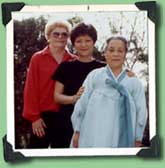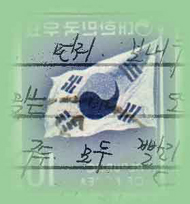 Deann Borshay was among thousands of South Korean orphans sent to the U.S. in the 1960s to be adopted and raised by American families. FIRST PERSON PLURAL is a personal documentary that chronicles her struggle to set right a case of mistaken indentity and unravel the mysteries surrounding her adoption.
Arnold and Alveen Borshay, a typical all-American couple, learned about the plight of South Korean orphans while watching television one afternoon. Emotionally moved by images of orphans in need, they enrolled as members of the Foster Parent's Plan and became the sponsors of Cha Jung Hee, a young girl in a Korean orphanage who had no family. After sending Cha Jung Hee $15.00 a month and writing letters for two years, the Borshays decided they wanted to adopt her.On March 3, 1966, they picked up their new daughter from the San Francisco International Airport and named her Deann.
Once in America, the newest Borshay tried to retain memories of her family in Korea. But her memories conflicted with information in her adoption file. Both she and her adoptive parents weretold that Deann was an orphan - her mother and father had died and she had no other living family.
The confusion between her actual memories and the "facts" as written in her adoption documents became so great, she developed amnesia. She forgot everything about Korea - how to speak Korean, any memories of a family, even her own name. Instead, she became consumed with an all-American childhood, with her father capturing all the significant milestones in home movies - first sip of Coke, first Easter egg hunt, first Halloween, leading up to cheerleading and her selection as class president and homecoming queen in high school.
Depression and a series of haunting dreams in later life made Borshay suspect that something wrong had happened with her adoption. Persistent flashbacks from Korea eventually drove Borshay to investigate her adoption file.
All of her documents indicated that she was indeed Cha Jung Hee, an orphan with no living family. She was initially dismayed by her findings. Then she found two small, faded photos tucked among some old letters. The pictures were of two different little girls. One picture looked like her, the other didn't. But both girls were being passed off as Cha Jung Hee. She knew im mediately that her suspicions had merit and wrote to the orphanage. mediately that her suspicions had merit and wrote to the orphanage.
She received a letter back from Korea addressed to "My dear sister, Ok Jin." Borshay learned that her birth name was Kang Ok Jin and that she had been switched at the last minute with Cha Jung Hee, another girl who had lived in the same orphanage. In addition to learning she was not the person she thought she was, Borshay discovered that her birth family - her mother, brother, and sisters - had been alive and well in Korea all along.
The discovery of her birth family and true identity answered a lot of mysteries but created a whole new set of problems for Borshay - how to balance loyalties to her adoptive family and her birth family, and how to integrate disparate elements of her identity.
In spring of 1998, Borshay travels to Korea with her adoptive parents to try to resolve lingering questions about her history. What emerges is an emotional and eye-opening first-time meeting
between her two families that exposes a daunting cultural divide and a bittersweet realization that often the first step in becoming whole is letting go of what one has already lost.
Combining archival footage of Korea, 8mm home movies, and powerful footage of Borshay and her two families as they meet for the first time, FIRST PERSON PLURAL is a story of one woman's struggle to integrate into her life two different families, cultures, languages, and loyalties. It is a universal story about living with paradox and navigating the sometimes tricky terrain of love and family.
An insightful commentary on the forces of assimilation, FIRST PERSON PLURAL also offers an unusual exploration of the "melting pot" theory as put into practice in one family. Through Borshay's journey we see that, in America, it is indeed possible to re-invent oneself. But transformation has its price. FIRST PERSON PLURAL illustrates the opportunities and the sacrifices of becoming American and the enduring legacy of one's past which perhaps can never be truly erased. |